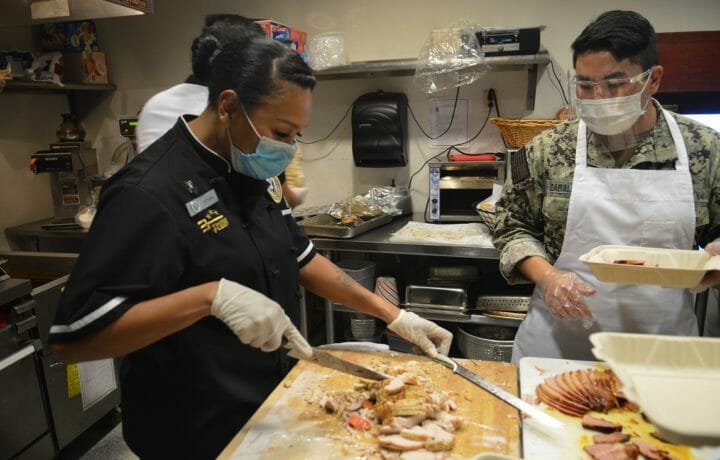The old U.S. Navy recruiting ads used to tell would-be sailors how they can see the world. It certainly didn’t make much mention of the food. That’s likely because few would likely compare the meals on a warship to those served on a cruise ship, and last year media reports even circulated of the “unacceptable” quality of food some sailors have had to endure.
The U.S. military has claimed those were isolated incidents, while the Navy has taken strides to improve the quality of the chow being served in recent years.
Who Serves the Sailors?
Since January 15, 2004, an occupational rating in the Navy is “culinary specialist” (CS) – formerly known as mess management specialist (MS) and prior to that commissaryman (CS) or steward (SD). These men and women take their duties very seriously, and Navy culinary specialists even operate the messes for the President of the United States in the White House and at Camp David.
While, no doubt the quality and variety of the food served to the leader of the free world is a bit higher than that served to the average sailor, the culinary specialists go all out for holidays – notably Thanksgiving.
Thanking Those in Uniform
The U.S. Naval Supply System Command (NAVSUP) announced that even with the ongoing pandemic, it will continue the turkey day traditions that began more than 100 years ago. This includes roast turkey in its Thanksgiving menu.
Operating in a COVID-19 environment, culinary specialists across the globe this year are getting ready with an estimated 79,000 pounds of roast turkey, 23,000 pounds of stuffing, 38,000 pounds of mashed potatoes, 18,000 pounds of sweet potatoes, 5,400 pounds of cranberry sauce, and 4,800 gallons of gravy to feed service members.
The menu wouldn’t look all that different from a traditional holiday feast that sailors may have eaten on the Cincinnati-class protected cruiser USS Raleigh (C-8) in 1905. The crew’s meal reportedly consisted of creamed asparagus bouillon; celery; creamed potatoes, young onions a la hollandaise, steamed cabbage and white sauce; oyster dressing; cranberry sauce; assorted nuts; and of course roast turkey.
As no feast would be complete without dessert, in 1905 sailors were offered a choice of pumpkin pie, mince pie, and fruit cake topped with whipped cream. This year, the U.S. Navy estimates that it will provide 8,092 assorted pies and deserts, including cheesecake, as well as pumpkin, sweet potato, cherry and apple pies.
More Than Working the Chow Line
To serve Thanksgiving meals to the 349,000 Navy active duty personnel and 4,500 mobilized Reservists serving in the U.S. Navy are the 8,700 culinary specialists, who now receive extensive training in culinary arts, hotel management and other areas within the hospitality industry.
In addition to feeding the hungry sailors on Thanksgiving and throughout the year, culinary specialists also provide food service catering and hospitality services for U.S. Navy admirals, senior government executives, and as noted, within the White House Mess for the President of the United States. This rating is also responsible for all aspects of the dining (shipboard mess decks) and shore duty living areas.
“Navy Culinary Specialists feed on average more than 78 million wholesome and nutritious meals per year, supporting 294 galleys afloat and ashore,” said NAVSUP Navy Food Service Director Cmdr. Leanne Riley.
“Their unwavering support of the Navy and joint warfighter ensures our fighting forces operate at peak performance, ready to respond to threats worldwide,” added Riley. “Our culinary professionals are the backbone of sailor readiness; nothing impacts sailors on a day-to-day basis more than the food our culinary specialists prepare for them.”
Other Branches Are Covered
It won’t be just the sailors who will be eating well on Thanksgiving. This week, the Pentagon also announced that for the holiday, it has sent nearly 60,000 pounds of roasted turkey to American troops stationed on U.S. military installations round the world.
And while there have been supply chain woes, and some consumers have even said they’ve come up short when finding the big bird for the big day, the Department of Defense’s (DoD’s) Defense Logistics Agency (DLA) has said they don’t expect any delays to disruptions to delivering dinner to the troops.
This year, service members are expected to receive 5,706 whole turkeys, 59,666 pounds of roasted turkeys, 99,187 pounds of beef, 51,994 pounds of ham, 43,767 pounds of shrimp, 38,400 pounds of sweet potatoes, 68,465 pounds of pies and cakes, and 23,461 gallons of eggnog.
“Thanksgiving is one of the most important meals we work on all year,” Col. Larry Dean, director of the subsistence supply chain at DLA Troop Support, told CNBC.com in a statement. “It means so much to have that taste of home on Thanksgiving when you can’t be there.”
While many COVID-19 restrictions are still in place, it should be a vast improvement over what many service members faced last year.
“The holiday meal should look more normal this year, with in-person dining returning in many locations,” said Defense Logistics Agency troop support commander Army Brig. Gen. Eric Shirley.




